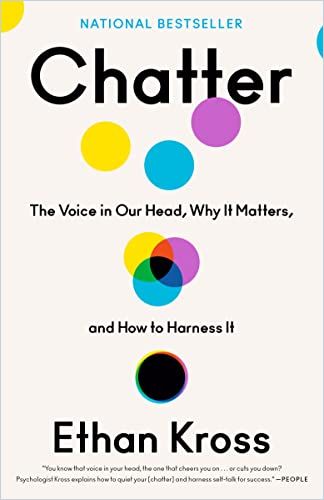Your inner voice can support professional performance and personal fulfillment – or undermine them. A psychologist explains how to put your thoughts to work for you, and quiet them when they get too loud.

Hushing the Voice in Your Head
Everyone has an inner voice that talks constantly – and people usually listen. The inner voice helps people function in the world and shapes their identity. But it can also take the form of mental chatter: the constant, negative loop of thoughts that can invade a person’s mind, take a toll on mental health, and harm relationships and career performance.
Psychologist Ethan Kross offers a compelling, accessible explanation of the sources and effects of chatter, along with a comprehensive toolbox of strategies for managing that inner voice. Kross, a professor at the University of Michigan’s psychology department and its Ross School of Business, studies introspection at Michigan’s Emotion and Self-Control Laboratory, which he founded. His insights will help readers whose biggest obstacle seems to be their own mind.
An Essential Part of the Self
Kross begins by assuring readers the inner voice is a normal, universal aspect of being human. It allows you to function in the world and makes you who you are. Kross describes a revealing study by anthropologist Andrew Irving, who approached New Yorkers in public places such as parks and cafés and asked them to record their internal monologues, out loud, as they went about their everyday lives. The recordings showed their thoughts vacillated rapidly from mundane concerns – finding the nearest Staples store, for example – to deep emotions such as profound grief. Thoughts often focused on the negative and showed a preoccupation with the self. And they rarely stopped. Irving’s subjects spent little time in the present; instead, their minds lurched constantly backward and forward between the past and the future.
Kross explains that the inner voice stems from working memory, the brain function that allows you to remember what someone said a few seconds ago in a conversation, or to look at a restaurant menu and remember its information long enough to choose your order. Among the most important components of working memory is the phonological loop, which includes an inner voice.
Our brain’s built-in affinity for disconnecting from what is going on around us produces a conversation in our minds, one that we spend a significant portion of our lives engaged in.Ethan Kross
The inner voice helps you control yourself – it begins in early childhood as an internalization of the parent’s or caregiver’s voice. The inner voice also helps you work toward goals by giving you reminders about goal-related activities. And it can help you run mental simulations of behavior, such as different ways to give a presentation or conduct a difficult conversation.
Why Chatter Matters
However, as Kross points out, mental chatter can cause a variety of negative effects, too. For example, people who need to perform skilled tasks, such as athletes, teachers, start-up founders and surgeons, can find chatter interfering with their performance. Many tasks, such as executing a complex maneuver in gymnastics, rely on a linked series of automatic behaviors; when chatter invades, those behaviors cease being automatic because the performer is now thinking about them. Chatter can similarly hijack a person’s brain capacity at work and cause poor job performance.
When we let chatter drive social behaviors, we frequently crash into a range of negative outcomes.Ethan Kross
When people overshare their inner chatter with others, it can push people away and, at worst, initiate a vicious cycle of social rejection and isolation. Chatter can also harm your physical health. Constant negative thoughts feed a chronic stress response in your body that links to health problems, including heart disease, sleep disorders and cancer, as well as mental illness.
Turn Down the Volume
Kross offers a menu of strategies to reduce the insistence of the inner voice when it interferes with performance or mental health. One key to quelling the mental clamor: Put some space between yourself and your thoughts. Kross describes a study in which psychology researchers asked participants to think of an upsetting memory. One group immersed themselves in the memory; a second group viewed the memory from the perspective of a bystander. The immersers found themselves pulled into negative emotions, while the distancers thought more clearly and felt better.
When you feel yourself entering an emotional vortex, Kross suggests focusing on the bigger picture rather than the minutiae of a problem, or experimenting with mental time-travel to the past or future. Thinking about the past grants perspective, and thinking about the future can help you see current experiences as temporary. Calling yourself by your name can also help you exit the spiral – Kross recommends simply telling yourself to calm down.
For Inner Peace, Seek Outer Calm, Control and Connection
Exposure to nature seems to calm the inner voice, reduce rumination and quiet chatter. In a study of residents of urban housing projects, residents whose apartments faced green spaces were found to focus their attention better, procrastinate less and think more clearly than those whose windows faced a brick wall.
Chatter also tends to diminish when you feel a sense of control and connection. Imposing structure in your environment can give you a feeling of being in control and thereby quiet your inner voice. Rituals can achieve the same effect – even superstitious rituals like the tradition of West Point cadets visiting a statue of General John Sedgwick at midnight before their exams. Kross explains that rituals work by distracting your attention from inner chatter and providing a sense of control and of connection to something bigger than yourself.
When you’re in the presence of something vast and indescribable, it’s hard to maintain that you – and the voice in your head – are the center of the world.Ethan Kross
Experiences of awe can also hush inner chatter, whether you visit the Grand Canyon, read an Emily Dickinson poem or watch an infant take its first steps. By granting perspective, awe-inspiring experiences improve well-being, reduce stress and enhance life satisfaction – effects that linger long after the experience.
Chatter offers a fascinating analysis of an everyday human phenomenon. For anyone in pursuit of self-awareness, it will build self-understanding; for readers in search of higher performance at work, on the athletic field or in the spotlight, Kross’s insights and strategies promise to enhance inner calm, focus and attention.













